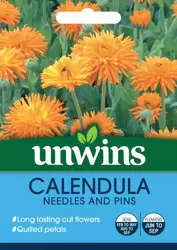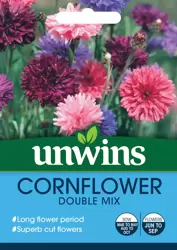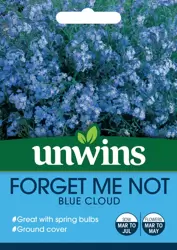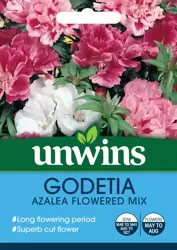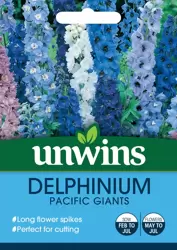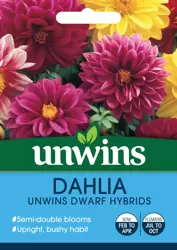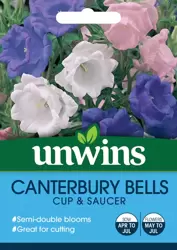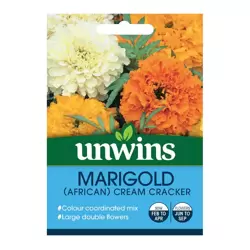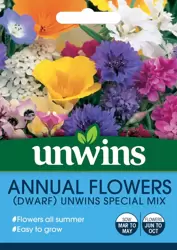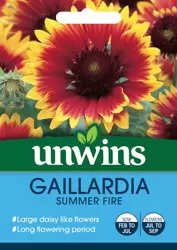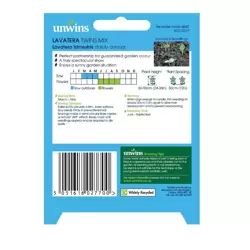Flower Seeds
To grow a magnific flower garden, buy your flower seeds at Fernhill Garden Centre. Our Unwins flower seeds provide you with stunning colours, delicate scent, and happy thoughts during bloom season. From Lavender to Dahlia's, we surely have everything you look for. Read the seed package to find out when, where and how to plant the seeds.
Filters
Planting flower seeds
Planting flower seeds is a rewarding and enjoyable activity that can bring beautiful blooms to any outdoor space. Whether you’re new to gardening or a seasoned pro, growing your own garden can be a fun and rewarding experience. There are many tips and tricks to help you get started and turn your garden into a vibrant, colourful space. With the right knowledge and a little bit of effort, you can create a beautiful flower garden that will give you a sense of accomplishment. From understanding the basics of seed selection and planting to learning how to care for your plants as they grow, here are some helpful tips and tricks to get you started on your journey of creating the perfect flower garden.
Understanding the basics of seed selection
With so many different types of seeds available, the selection process can seem overwhelming. When choosing which seeds to plant in your flower garden, you should think about what types of flowers you want to grow in your garden, as well as the type of conditions they prefer. There are many factors to consider when choosing seeds, such as:
- the amount of sunlight they need
- when they bloom
- their colour
- how long they last
The type of flower you choose will depend on the colour and scent you want in your garden. You should also consider how large the flowers will grow and if there are any special needs the plant has, such as needing to be pollinated by insects. Some ways to select seeds include browsing online catalogues, reading seed packets, and looking at seed websites.
Selecting the right location and supplies
Before you start planting your flower seeds, you should take the time to carefully plan where you want to place them in the garden. Some questions you should consider include:
- What type of flowers do you want to grow?
- How many of each type?
- Where do you want them to be planted?
- Where do they need the most sunlight?
Once you have considered these questions, you can start to decide where each plant should go. You should also be sure to prepare your garden bed in advance. Make sure the soil is loose and has the right amount of nutrients for optimal plant growth. You can also add a soil amendment, like compost, to provide extra nutrients to your plants. You will also need to decide which supplies you need to get your seeds growing. You will probably need a trowel or shovel, gloves, a rake or hoe, and potting soil or seed-starting mix.
Planting your flower seeds
Before you plant your flower seeds, you should make sure the soil is ready. You can do this by loosening the soil with a garden fork. You should also add a fertiliser appropriate for the type of garden you have. Next, you should create small holes with a trowel or other small digging tool and place your seeds in the holes. Be sure to cover the seeds with soil, leaving about half an inch space between the top of the soil and the surface. Make sure you water the seeds and keep the soil moist but not wet until they start to sprout. You also need to protect young plants from pests and weather damage. When planting flowers, you can use a row cover or pieces of netting to help protect them from pests. You can also invest in some simple insect repellents, like peppermint oil, to help keep pests away from your plants.
Caring for your flower garden
Once the seeds in your flower garden have sprouted and grown into healthy plants, there are a few things you can do to care for them and help them thrive. The first thing you should do is water your plants regularly. You can check soil moisture by taking a handful of soil and squeezing it. If it crumbles like dry sand, your plants could use some water. You should water your plants as needed, but make sure you don’t over- or underwater them. You can also use mulch around your plants to help retain soil moisture and prevent weeds from growing. Another thing you can do to help your plants thrive is weed regularly. Weeds steal nutrients and water from your plants, so it is important to keep them under control.
Fertilising and mulching
As your plants start growing, you will need to fertilise them to boost their growth and help them thrive. You can add a fertiliser to your watering can or water your plants with a liquid fertiliser. You can also use compost to fertilise your soil. You can add compost to your soil before planting, or you can top-dress your plants with it. Another way to add nutrients to your soil without using chemicals is to mulch your plants. You can use wood chips, shredded paper, or organic materials to mulch around your plants, or you can use plastic materials like landscape fabric. For best results, add fertiliser or mulch after your plants have sprouted but before they have grown above ground level.
Planting companion flowers
Some plants, like carrots, lettuce, and radishes, can be planted together with certain flowers to create beautiful, vibrant gardens. To do this, you should plant flowers that insects pollinate in the same area as your vegetables. You can plant these flowers in front of or between your vegetables. You can also plant flowers that attract bees or butterflies around your garden to help pollinate your vegetable plants. Some flowers that attract bees and butterflies include marigolds, zinnias, and cosmos.
Enjoying your garden
Once your garden has blossomed, you can sit back and enjoy the fruits of your labour. You can use your flower garden for many different purposes, like decoration, relaxation, or growing food. Using your garden for decoration can be a great way to bring colour and life to your outdoor space and make your house seem more welcoming. Growing your own food in your flower garden can be a rewarding experience and provide you with fresh produce all year round. Having a flower garden can be a fun and rewarding experience. Once your seeds have sprouted and grown into beautiful plants, sitting back and enjoying the fruits of your labour can be enjoyable.


